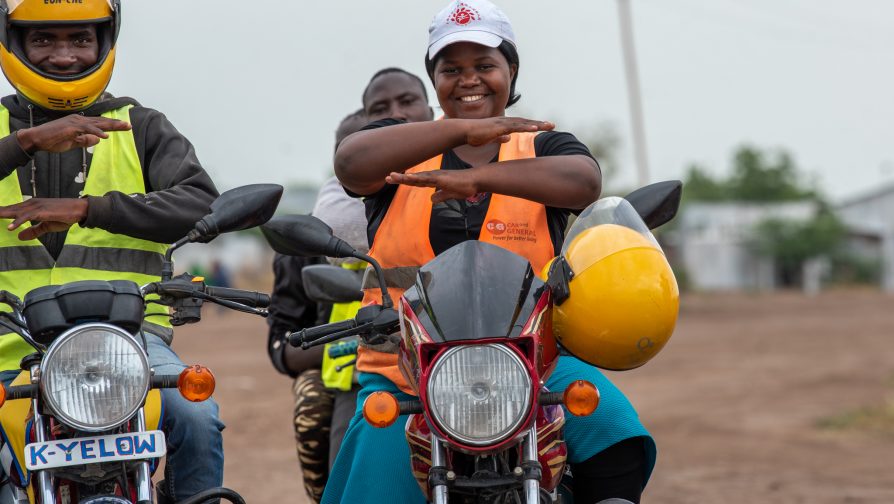We ought to come together and work together regardless of the gender
Palagie Niyukuri, 34 year old mother of six; first female refugee motorbike taxi rider in Kakuma refugee camp. ©UNHCR/Samuel Otieno
When Palagie Niyukuri fled conflict back home in Makamba Province, Burundi, 7 years ago, all she had was her family and her education. Now, the 34-year-old mother of six is the first female refugee motorbike taxi rider in Kakuma refugee camp.
“People around here call me Mama Boda-boda, now it has become my nickname.”
Motorbike, popularly known as boda-boda, is a popular mean of transport in East Africa including in Kakuma. They are considered faster, more affordable, and gives refugees a source of income.
For Palagie, her motorbike is her only source of income to feed and raise her six children. The single mother says she is able to supplement humanitarian assistance she receives in the refugee camp with income from her taxi driving business which also repays for the loan she borrowed to purchase the motorbike.
“I’m slowly paying back just like anyone else in weekly instalments.”
People call me Mama Boda-boda
She portrays a confident rider as she stops to park her motorbike alongside male riders. Despite the numerous challenges in the male dominated business, she has been riding for months and has curved a niche as a safe and reliable rider.
“I believe in my abilities and I know I am strong and ride well and safely. Sometimes, men will want me to transport them because they know I’m a safe rider.”
Although small in numbers, female taxi riders like Palagie have made a breakthrough because some customers prefer riding with women than men. However, unlike their male counterparts, female riders are faced greater responsibility and have to find a balance between the business and taking care of family.
“My day begins with preparing my kids for school. I have to do several trips to ensure all my children get to and from school on time, and perform my duties as a mother, ” Palagie says.
I am doing this for other women
For Palagie, her safety and that of the passengers comes first. Her decision to venture into the taxi business emanated from her undesirable experience as a female passenger.
“I am doing this for other women who could experience the same.”
She notes that women tend to feel more comfortable and secure with female riders. During the rides, she is able to strike conversations with passengers on women issues which help her to build relationships and trust.
But her successful venture did not come easy. She continues to face numerous challenges including gender stereotypes and bias, and access to capital.

“We ought to come together and work together regardless of the gender.” For Palagie, her motorbike is her only source of income to feed and raise her six children. ©UNHCR/Samuel Otieno
“Some people ask me why I’m doing this work that is meant for men, but I have learnt to encourage myself and other women to go ahead. We ought to come together and work together regardless of the gender,” Palagie says.
Access to start-up capital remains the biggest hurdle for budding refugee entrepreneurs despite efforts by the UN Refugee Agency (UNHCR), partners and the private sectors giving support to refugees. For motorbike taxi riders like Palagie, poor road infrastructure also means huge part of their profits is gobbled by repairs and maintenance.
Women tend to feel more comfortable and secure with female riders
On 8 March 2020, UNHCR joined the world marking the international Women’s Day with a call to forge a gender equal world. Palagie’s inspiring story is just one of the numerous success stories by women that challenge gender stereotypes and bias.
Share on Facebook Share on Twitter